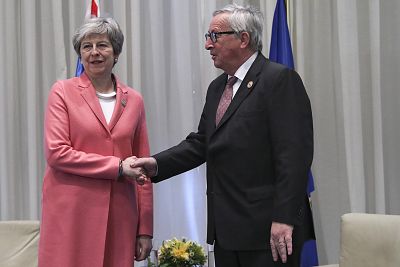There's just over a month until the U.K. is due to leave the European Union and no one can be sure how Brexit will play out.
LONDON — Brexit has brought a serious dose of drama to normally staid British politics.
The defections of lawmakers from both of the country's two main parties to a new centrist group, and the opposition Labour Party taking a step toward campaigning for a new Brexit referendum has ramped up the uncertainty.
There's just over a month until the U.K. is due to leave the European Union and no divorce deal has been approved by Parliament, meaning the current default position is that Britain faces what many have warned will be a catastrophic departure from the 28-member bloc on March 29.
Here's a look at the latest developments and what could happen next.
How did we get here?
In January, the withdrawal agreement that Prime Minister Theresa May spent nearly two years negotiating with the E.U. was widely rejected by lawmakers.
Since then, she's delayed putting forward another plan.
Unless a deal is approved by lawmakers, trade between the U.K. and the E.U., which is now seamless, could reduce to a trickle.
Supermarkets have warned there may be shortages of fresh produce, businesses are stockpiling goods and the government is stockpiling medicines.
What is Labour's position?
The opposition party called on Monday for a second referendum on Brexit if Parliament rejects Labour's alternative plan for leaving the E.U.
Like the Conservatives, the party has pledged to leave the bloc, though it would like a closer relationship with Britain's largest trading partner.
Until now, Labour has put off calls, including from many of its own lawmakers, to support a second referendum. That changed on Monday.
World news
Parliament is due to debate and vote on Wednesday on the next steps in the tortuous departure from the E.U., and lawmakers are set to offer proposals on the way forward.
Labour said it would put forward an amendment calling on the government to adopt its Brexit proposals, which would maintain a similar trading relationship to the status quo.
"If Parliament rejects our plan, then Labour will deliver on the promise we made at our annual conference and support a public vote," Labour's Brexit spokesman Keir Starmer said.
It is not yet clear whether there is support in Parliament for a second referendum.
Why did Labour change tack?
Labour leader Jeremy Corbyn has been under pressure for months by party members and some of his own lawmakers to support a second referendum. But he's had to balance demands from other Labour lawmakers who want to leave the bloc.
Corbyn has also been a fierce critic of the E.U. in the past, though he claims to have voted to remain in the June 2016 referendum.
After the leave side won the vote, members of his own party sharply criticized him for not campaigning hard enough for the pro-E.U. side.
World news
Last week, that tension in the party came to a head when a group of seven Labour lawmakers announced they were leaving over the party's Brexit stance as well as other issues, including its approach to anti-Semitism. Two more lawmakers left later in the week amid claims of anti-Semitism in the party.
"The Labour Party that we joined, that we campaigned for and believed in, is no longer today's Labour Party. We did everything we could to save it, but it has now been hijacked by the machine politics of the hard left," defecting lawmaker Chris Leslie told a news conference at the time.
It's no accident that a week later the party announced a change to its approach on Brexit, analysts say.
"Pressure from the outside has changed the debate within the party," said Sunder Katwala, the director of the independent British Future think tank. "Labour's view until now has been that moderates had nowhere else to go. Both parties are now worried about losing their center flank so it's changed the internal arguments about the political consequences."
Support for Corbyn in the polls has also fallen.
When people were asked who they thought would make the best prime minister, only 16 percent said Corbyn, behind May at 39 percent and "don't know" at 42 percent, according to a YouGov/Times newspaper poll published Tuesday.
What's the new political group stand for?
The Labour leavers called themselves The Independent Group, and are presenting themselves as a new centrist option. They were joined last Wednesday by three pro-E.U. lawmakers from Britain's ruling Conservatives.
The group has yet to lay out concrete policies but the 11 members are in favor of a second referendum on Brexit. It has said that it intends to "pursue policies that are evidence-based, not led by ideology."
Early polls show a strong interest in the new party. In a YouGov poll, 18 percent said they would support the Independent Group.
What happens next?
That's still the million dollar question. No one can be sure how Brexit will play out.
On Monday, May insisted that a Brexit deal was still "in our grasp," even though she hasn't managed to win Parliament's support for her divorce agreement.
If the deal is again rejected, May said Tuesday that she would give Parliament the opportunity to vote on extending Britain's membership in the E.U. for a short time.
May has said a new vote on any revised Brexit deal could come as late as March 12 — just 17 days before the country's scheduled departure.
"The E.U. is our nearest neighbor, and something has to get sorted out," said Bronwen Maddox, the director of the non-partisan Institute for Government think tank.
"But it will be a messy procedure," she added.












